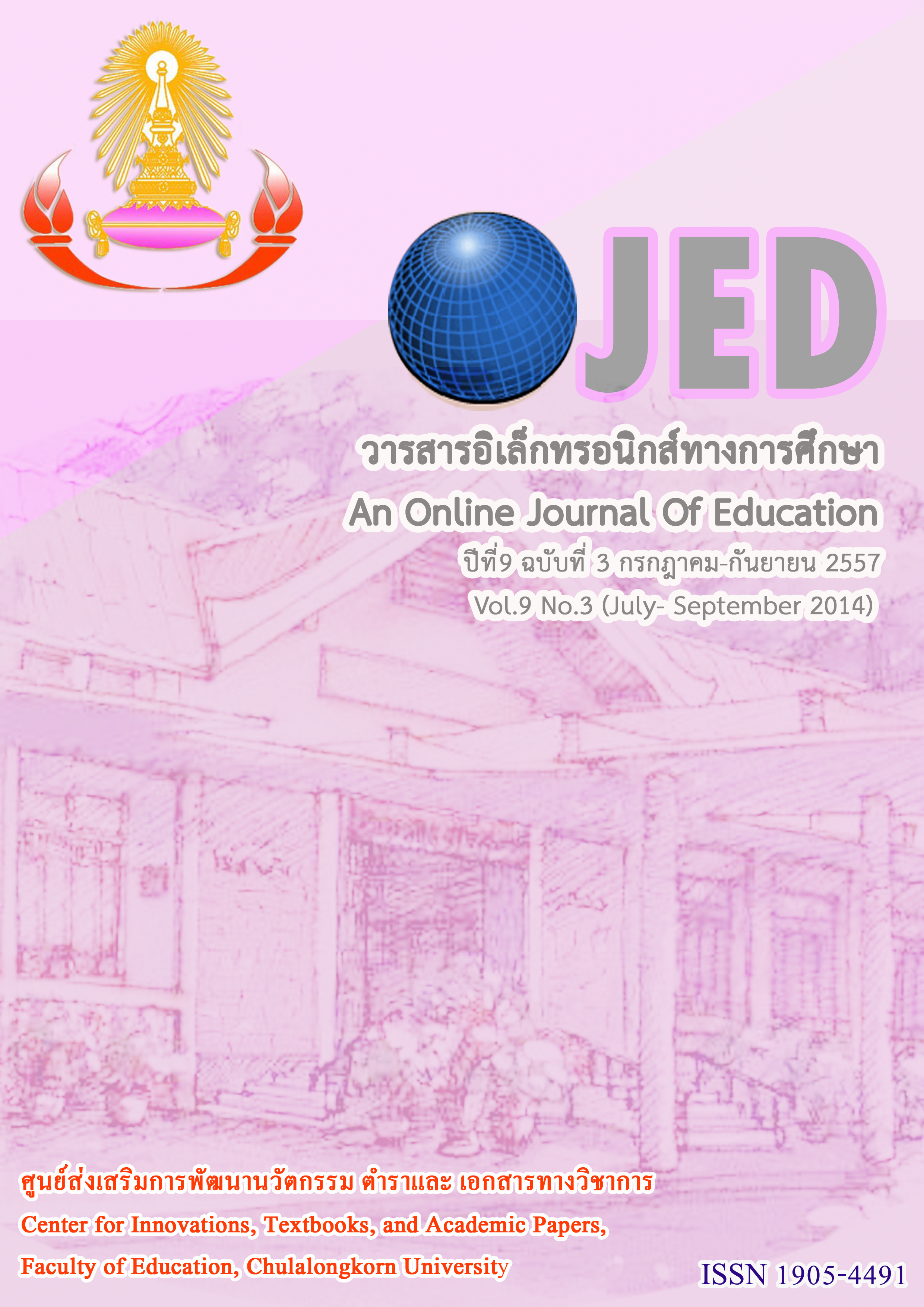การบริหารจัดการของสถานศึกษาขั้นพื้นฐานในโครงการพัฒนาสู่ประชาคมอาเซียน ของกระทรวงศึกษาธิการ
Keywords:
การบริหารจัดการ, โครงการพัฒนาสู่ประชาคมอาเซียน, THE MANAGEMENT, THE SPIRIT OF ASEAN PROJECTAbstract
การวิจัยครั้งนี้มีวัตถุประสงค์เพื่อศึกษาสภาพและปัญหาการบริหารจัดการของสถานศึกษาขั้นพื้นฐานในโครงการพัฒนาสู่ประชาคมอาเซียนของกระทรวงศึกษาธิการ โดยใช้กรอบแนวคิดหน้าที่การบริหารของ Koontz และ Weihrich (2010) และบทบาทหน้าที่ของสถานศึกษาในโครงการพัฒนาสู่ประชาคมอาเซียน ของกระทรวงศึกษาธิการ ประชากรในการวิจัยคือ โรงเรียนในโครงการพัฒนาสู่ประชาคมอาเซียน ของกระทรวงศึกษาธิการ จำนวน 54 โรงเรียน ผู้ให้ข้อมูลคือ ผู้บริหารสถานศึกษา ครูผู้รับผิดชอบศูนย์อาเซียนศึกษา และเจ้าหน้าที่ประจำศูนย์อาเซียนศึกษา คิดเป็นผู้ให้ข้อมูลทั้งหมด 162 คน เครื่องมือที่ใช้ในการวิจัยเป็นแบบสอบถามแบบตรวจสอบรายการ วิเคราะห์ข้อมูลโดยหาค่าความถี่ ค่าร้อยละ
ผลการวิจัยพบว่า 1) ด้านการวางแผน มีขั้นตอนกำหนดจุดมุ่งหมายและวัตถุประสงค์ให้สอดคล้องกับคู่มือการดำเนินงานโครงการพัฒนาสู่ประชาคมอาเซียนมากที่สุด 2) ด้านการจัดองค์การ มีการมอบหมายกิจกรรมให้เหมาะสมกับบุคลากร โดยบุคลากรมีอำนาจในการตัดสินใจเรื่องที่เกี่ยวกับภาระหน้าที่ที่ได้รับมอบหมายด้วยตนเองอยู่ในระดับมาก 3) ด้านการจัดคนเข้าทำงาน การคัดเลือกพิจารณาจากคุณสมบัติตามที่คู่มือการดำเนินงานโครงการพัฒนาสู่ประชาคมอาเซียนกำหนดมากที่สุด การพัฒนาบุคลากรโดยการศึกษาหาความรู้เพิ่มเติมจากสื่อออนไลน์มีการปฏิบัติมากที่สุด 4) ด้านการนำ ผู้ที่แสดงบทบาทภาวะผู้นำมากที่สุดคือผู้อำนวยการสถานศึกษา โรงเรียนมีการส่งเสริม จูงใจให้บุคลากรปฏิบัติหน้าที่โดยจัดให้มีสื่อ แหล่งเรียนรู้เรื่องอาเซียนในโรงเรียนมากที่สุด 5) ด้านการควบคุม เมื่อผลการดำเนินงานไม่เป็นไปตามเป้าหมาย หรือวัตถุประสงค์ โรงเรียนดำเนินการโดยประชุมปรึกษาหารือทุกฝ่ายที่เกี่ยวข้องเพื่อหาทางปรับปรุงแก้ไขมากที่สุด ปัญหาที่พบมากที่สุดคือ ปัญหาด้านการพัฒนาบุคลากร โดยพบว่างบประมาณสำหรับการพัฒนาบุคลากรไม่เพียงพอ
The objective of this research aimed to study the conditions and problems of the management of basic education institutions in the spirit of ASEAN project under the ministry of Education by using the concept of administration functions from Koontz and Weihrich (2010) and the roles of the education institutions. The participants of this research included 162 people from 54 schools involved in the spirit of ASEAN project. The contributors were education services providers, teachers, authorities of the ASEAN Study Center, and ASEAN Study Center’s officer. The research tools used were checklist questionnaires analyzed by frequency and percentage.
The results showed that 1) for planning, the aims and objectives in accordance with the operation manual of the spirit of ASEAN project had the highest score. 2) For organizing, the assignment of activities to suit the assigned personnel by a person with authority to make decisions about appropriate duties had a high score. 3) For staffing, the selection from qualities according to the operation manual in the spirit of ASEAN project had the highest score. The highest score was for staff development learning through online media. 4) For leadership, the person who had highest leadership score was the director of institutes. Schools had encouraged and motivated staff by providing media of information about ASEAN in schools. 5) For controlling, when performance did not meet the targets or objectives, school consultations were undertaken by all parties involved to find ways to improve. The most common problem concerned staff development for which the budget was not sufficient.




